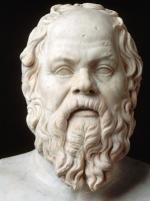|
This section contains 8,158 words (approx. 28 pages at 300 words per page) |

|
SOURCE: "The Thinker," in Socrates: Master of Life, The Open Court Publishing Co., 1915, pp. 62-118.
In this excerpt, Leonard explores the relationship between Socrates's philosophy and personal morality. The philosopher's goal, Leonard claims, was to reform human conduct.
I.
Every exposition of Greek thought, from the most pedantic to the most popular, has been divided into the two chapters, "Before Socrates," "After Socrates"; between which has stood a third, devoted to Socrates himself. Though he published no book in prose or verse, no philosophic hexameters on nature, no dialectic treatise on the Absolute, no criticism on ethics, politics, or the divinities that shape or refuse to shape the ends of man, his centrality to the development of speculation, as the mind which, while itself indifferent to the activities of its predecessors, brought to light other principles not only directive for thought in hitherto uncharted realms, but essential for...
|
This section contains 8,158 words (approx. 28 pages at 300 words per page) |

|


